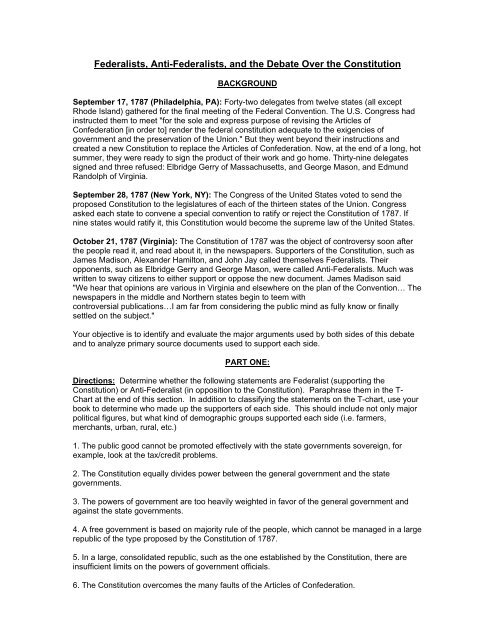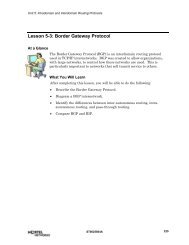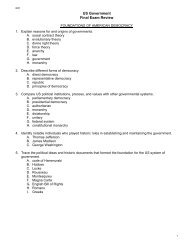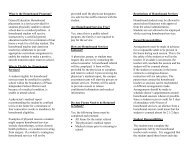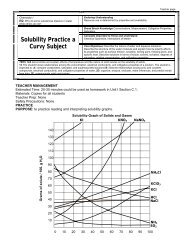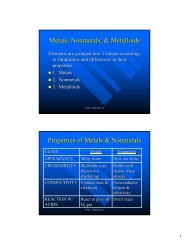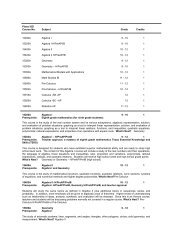Federalists, Anti-Federalists, and the Debate Over the Constitution
Federalists, Anti-Federalists, and the Debate Over the Constitution
Federalists, Anti-Federalists, and the Debate Over the Constitution
Create successful ePaper yourself
Turn your PDF publications into a flip-book with our unique Google optimized e-Paper software.
<strong>Federalists</strong>, <strong>Anti</strong>-<strong>Federalists</strong>, <strong>and</strong> <strong>the</strong> <strong>Debate</strong> <strong>Over</strong> <strong>the</strong> <strong>Constitution</strong><br />
BACKGROUND<br />
September 17, 1787 (Philadelphia, PA): Forty-two delegates from twelve states (all except<br />
Rhode Isl<strong>and</strong>) ga<strong>the</strong>red for <strong>the</strong> final meeting of <strong>the</strong> Federal Convention. The U.S. Congress had<br />
instructed <strong>the</strong>m to meet "for <strong>the</strong> sole <strong>and</strong> express purpose of revising <strong>the</strong> Articles of<br />
Confederation [in order to] render <strong>the</strong> federal constitution adequate to <strong>the</strong> exigencies of<br />
government <strong>and</strong> <strong>the</strong> preservation of <strong>the</strong> Union." But <strong>the</strong>y went beyond <strong>the</strong>ir instructions <strong>and</strong><br />
created a new <strong>Constitution</strong> to replace <strong>the</strong> Articles of Confederation. Now, at <strong>the</strong> end of a long, hot<br />
summer, <strong>the</strong>y were ready to sign <strong>the</strong> product of <strong>the</strong>ir work <strong>and</strong> go home. Thirty-nine delegates<br />
signed <strong>and</strong> three refused: Elbridge Gerry of Massachusetts, <strong>and</strong> George Mason, <strong>and</strong> Edmund<br />
R<strong>and</strong>olph of Virginia.<br />
September 28, 1787 (New York, NY): The Congress of <strong>the</strong> United States voted to send <strong>the</strong><br />
proposed <strong>Constitution</strong> to <strong>the</strong> legislatures of each of <strong>the</strong> thirteen states of <strong>the</strong> Union. Congress<br />
asked each state to convene a special convention to ratify or reject <strong>the</strong> <strong>Constitution</strong> of 1787. If<br />
nine states would ratify it, this <strong>Constitution</strong> would become <strong>the</strong> supreme law of <strong>the</strong> United States.<br />
October 21, 1787 (Virginia): The <strong>Constitution</strong> of 1787 was <strong>the</strong> object of controversy soon after<br />
<strong>the</strong> people read it, <strong>and</strong> read about it, in <strong>the</strong> newspapers. Supporters of <strong>the</strong> <strong>Constitution</strong>, such as<br />
James Madison, Alex<strong>and</strong>er Hamilton, <strong>and</strong> John Jay called <strong>the</strong>mselves <strong>Federalists</strong>. Their<br />
opponents, such as Elbridge Gerry <strong>and</strong> George Mason, were called <strong>Anti</strong>-<strong>Federalists</strong>. Much was<br />
written to sway citizens to ei<strong>the</strong>r support or oppose <strong>the</strong> new document. James Madison said<br />
"We hear that opinions are various in Virginia <strong>and</strong> elsewhere on <strong>the</strong> plan of <strong>the</strong> Convention… The<br />
newspapers in <strong>the</strong> middle <strong>and</strong> Nor<strong>the</strong>rn states begin to teem with<br />
controversial publications…I am far from considering <strong>the</strong> public mind as fully know or finally<br />
settled on <strong>the</strong> subject."<br />
Your objective is to identify <strong>and</strong> evaluate <strong>the</strong> major arguments used by both sides of this debate<br />
<strong>and</strong> to analyze primary source documents used to support each side.<br />
PART ONE:<br />
Directions: Determine whe<strong>the</strong>r <strong>the</strong> following statements are Federalist (supporting <strong>the</strong><br />
<strong>Constitution</strong>) or <strong>Anti</strong>-Federalist (in opposition to <strong>the</strong> <strong>Constitution</strong>). Paraphrase <strong>the</strong>m in <strong>the</strong> T-<br />
Chart at <strong>the</strong> end of this section. In addition to classifying <strong>the</strong> statements on <strong>the</strong> T-chart, use your<br />
book to determine who made up <strong>the</strong> supporters of each side. This should include not only major<br />
political figures, but what kind of demographic groups supported each side (i.e. farmers,<br />
merchants, urban, rural, etc.)<br />
1. The public good cannot be promoted effectively with <strong>the</strong> state governments sovereign, for<br />
example, look at <strong>the</strong> tax/credit problems.<br />
2. The <strong>Constitution</strong> equally divides power between <strong>the</strong> general government <strong>and</strong> <strong>the</strong> state<br />
governments.<br />
3. The powers of government are too heavily weighted in favor of <strong>the</strong> general government <strong>and</strong><br />
against <strong>the</strong> state governments.<br />
4. A free government is based on majority rule of <strong>the</strong> people, which cannot be managed in a large<br />
republic of <strong>the</strong> type proposed by <strong>the</strong> <strong>Constitution</strong> of 1787.<br />
5. In a large, consolidated republic, such as <strong>the</strong> one established by <strong>the</strong> <strong>Constitution</strong>, <strong>the</strong>re are<br />
insufficient limits on <strong>the</strong> powers of government officials.<br />
6. The <strong>Constitution</strong> overcomes <strong>the</strong> many faults of <strong>the</strong> Articles of Confederation.
7. The objects of <strong>the</strong> Union could not be secured by any system founded on <strong>the</strong> principle of a<br />
confederation of sovereign states.<br />
8. There is no Declaration of Rights; <strong>and</strong> <strong>the</strong> laws of <strong>the</strong> general government being paramount to<br />
<strong>the</strong> laws <strong>and</strong> constitutions of <strong>the</strong> several states, <strong>the</strong> Declaration of Rights in <strong>the</strong> separate states<br />
are no security.<br />
9. A large republic as established under <strong>the</strong> constitution could more successfully elect proper<br />
guardians of natural rights <strong>and</strong> thus control <strong>the</strong> negative effects of factions.<br />
10. The <strong>Constitution</strong> grants too much power to <strong>the</strong> executive branch.<br />
11. The <strong>Constitution</strong> grants too much power to <strong>the</strong> legislative branch.<br />
12. The <strong>Constitution</strong> has provided a system by which no one department can control or dominate<br />
<strong>the</strong> o<strong>the</strong>rs thus preventing <strong>the</strong> possibility of arbitrary rule.<br />
13. The <strong>Constitution</strong> is necessary for a strong foreign policy.<br />
14. A strong central government is necessary given human nature.<br />
15. Under <strong>the</strong> <strong>Constitution</strong> we will lose what we fought for in <strong>the</strong> Revolution.<br />
<strong>Federalists</strong><br />
Major Arguments:<br />
<strong>Anti</strong>-<strong>Federalists</strong><br />
Major Arguments:<br />
Who were <strong>the</strong>y?<br />
Who were <strong>the</strong>y?
PART TWO:<br />
Directions: Analyze <strong>the</strong> following documents. Summarize <strong>the</strong> major ideas put forth in each<br />
document. Determine whe<strong>the</strong>r <strong>the</strong> document is Federalist or <strong>Anti</strong>-Federalist, <strong>and</strong> determine<br />
which of <strong>the</strong> statements from your T-chart aligns with each document. Each of <strong>the</strong>se documents<br />
will match up with more than one statement from <strong>the</strong> T-chart.<br />
DOCUMENT A:<br />
In every free government, <strong>the</strong> people must give <strong>the</strong>ir assent to <strong>the</strong> laws by which <strong>the</strong>y are<br />
governed. This is <strong>the</strong> true criterion between a free government <strong>and</strong> an arbitrary one. The former<br />
are ruled by <strong>the</strong> will of <strong>the</strong> [people]; <strong>the</strong> latter by <strong>the</strong> will of one, or a few… Now, in a large<br />
extended country [like <strong>the</strong> U.S.], it is impossible to have a representation [of <strong>the</strong> people] to<br />
declare <strong>the</strong> minds of <strong>the</strong> people, without having it so numerous <strong>and</strong> unwieldy, as to be unable to<br />
function effectively…<br />
In so extensive a republic, <strong>the</strong> great officers of <strong>the</strong> government would soon become above <strong>the</strong><br />
control of <strong>the</strong> people, <strong>and</strong> abuse <strong>the</strong>ir power to <strong>the</strong> purpose of aggr<strong>and</strong>izing <strong>the</strong>mselves <strong>and</strong><br />
oppressing <strong>the</strong>m. The remedy is to emphasize representative governments in <strong>the</strong> states-<strong>the</strong> ones<br />
closest to <strong>the</strong> people-<strong>and</strong> to strictly limit <strong>the</strong> powers of <strong>the</strong> general government of <strong>the</strong> United<br />
States.<br />
Main Ideas:<br />
Federalist/<strong>Anti</strong>-federalist?<br />
Which statements align with this document?<br />
DOCUMENT B:<br />
But <strong>the</strong> great security against a gradual concentration of <strong>the</strong> several powers in <strong>the</strong> same<br />
department, consists in giving to those who administer each department <strong>the</strong> necessary<br />
constitutional means <strong>and</strong> personal motives to resist encroachment of <strong>the</strong> o<strong>the</strong>rs. The provision for<br />
defense must in this, as in all o<strong>the</strong>r cases, be made commensurate to <strong>the</strong> danger of attack.<br />
Ambition must be made to counteract ambition. The interest of <strong>the</strong> man must be connected with<br />
<strong>the</strong> constitutional rights of <strong>the</strong> place. It may be a reflection on human nature, that such devices<br />
should be necessary to control <strong>the</strong> abuses of government. But what is government itself, but <strong>the</strong><br />
greatest of all reflections on human nature? If men were angels, no government would be<br />
necessary. If angels were to govern men, nei<strong>the</strong>r external nor internal controls on government<br />
would be necessary. In framing a government, which is to be administered by men over men, <strong>the</strong><br />
great difficulty lies in this: you must first enable <strong>the</strong> government to control <strong>the</strong> governed; <strong>and</strong> in<br />
<strong>the</strong> next place oblige it to control itself. A dependence on <strong>the</strong> people is, no doubt, <strong>the</strong> primary<br />
control on <strong>the</strong> government; but experience has taught mankind <strong>the</strong> necessity of auxiliary<br />
precautions.<br />
Main Ideas:<br />
Federalist/<strong>Anti</strong>-federalist?<br />
Which statements align with this document?
DOCUMENT C:<br />
The territory of <strong>the</strong> United States is of vast extent; it now contains near three million souls…Is it<br />
practicable for a country, so large <strong>and</strong> so numerous as <strong>the</strong>y will soon become, to elect a<br />
representation, that will speak <strong>the</strong>ir sentiments, without <strong>the</strong>ir becoming so numerous as to be<br />
incapable of transacting public business? It certainly is not.<br />
In a republic, <strong>the</strong> manners, sentiment, <strong>and</strong> interests of <strong>the</strong> people should be similar. If this is not<br />
<strong>the</strong> case, <strong>the</strong>re will be a constant clashing of opinions; <strong>and</strong> <strong>the</strong> representatives of one part will be<br />
continually striving against those of <strong>the</strong> o<strong>the</strong>r. This will retard <strong>the</strong> operations of government, <strong>and</strong><br />
prevent such conclusions as will promote <strong>the</strong> public good. If we apply this remark to <strong>the</strong><br />
conditions of <strong>the</strong> United States, we shall be convinced that it forbids that we should be one<br />
government.<br />
Main Ideas:<br />
Federalist/<strong>Anti</strong>-federalist?<br />
Which statements align with this document?<br />
DOCUMENT D:<br />
My principal objections to <strong>the</strong> plan, are, that <strong>the</strong>re is no adequate provision for a representation of<br />
<strong>the</strong> people…that some of <strong>the</strong> powers of <strong>the</strong> Legislature are ambiguous, <strong>and</strong> o<strong>the</strong>rs are indefinite<br />
<strong>and</strong> dangerous [because <strong>the</strong>y might be exp<strong>and</strong>ed <strong>and</strong> endanger liberty]-that <strong>the</strong> Executive is<br />
blended with <strong>and</strong> will have an undue influence over <strong>the</strong> Legislature [<strong>the</strong> people are represented<br />
most directly in <strong>the</strong> Legislature, so it should be <strong>the</strong> dominant branch]-that <strong>the</strong> judicial department<br />
will be oppressive [because <strong>the</strong> judges are not accountable to <strong>the</strong> people]…<strong>and</strong> that <strong>the</strong> system<br />
is without <strong>the</strong> security of a bill of rights…<br />
Main Ideas:<br />
Federalist/<strong>Anti</strong>-federalist?<br />
Which statements align with this document?<br />
DOCUMENT E:<br />
It is remarkable, that <strong>the</strong> resemblance of <strong>the</strong> plan of <strong>the</strong> convention to <strong>the</strong> act which organizes <strong>the</strong><br />
government of this State holds, not less with regard to many of <strong>the</strong> supposed defects, than to <strong>the</strong><br />
real excellences of <strong>the</strong> former. Among <strong>the</strong> pretended defects are <strong>the</strong> re-eligibility of <strong>the</strong> Executive,<br />
<strong>the</strong> want of a council, <strong>the</strong> omission of a formal bill of rights, <strong>the</strong> omission of a provision respecting<br />
<strong>the</strong> liberty of <strong>the</strong> press. These <strong>and</strong> several o<strong>the</strong>rs which have been noted in <strong>the</strong> course of our<br />
inquiries are as much chargeable on <strong>the</strong> existing constitution of this State, as on <strong>the</strong> one<br />
proposed for <strong>the</strong> Union; <strong>and</strong> a man must have slender pretensions to consistency, who can rail at<br />
<strong>the</strong> latter for imperfections which he finds no difficulty in excusing in <strong>the</strong> former. Nor indeed can<br />
<strong>the</strong>re be a better proof of <strong>the</strong> insincerity <strong>and</strong> affectation of some of <strong>the</strong> zealous adversaries of <strong>the</strong><br />
plan of <strong>the</strong> convention among us, who profess to be <strong>the</strong> devoted admirers of <strong>the</strong> government<br />
under which <strong>the</strong>y live, than <strong>the</strong> fury with which <strong>the</strong>y have attacked that plan, for matters in regard<br />
to which our own constitution is equally or perhaps more vulnerable.<br />
The additional securities to republican government, to liberty <strong>and</strong> to property, to be derived from<br />
<strong>the</strong> adoption of <strong>the</strong> plan under consideration, consist chiefly in <strong>the</strong> restraints which <strong>the</strong>
preservation of <strong>the</strong> Union will impose on local factions <strong>and</strong> insurrections, <strong>and</strong> on <strong>the</strong> ambition of<br />
powerful individuals in single states, who may acquire credit <strong>and</strong> influence enough, from leaders<br />
<strong>and</strong> favorites to become <strong>the</strong> despots of <strong>the</strong> people; in <strong>the</strong> diminution of <strong>the</strong> opportunities to<br />
foreign intrigue, which <strong>the</strong> dissolution of <strong>the</strong> Confederacy would invite <strong>and</strong> facilitate; in <strong>the</strong><br />
prevention of extensive military establishments, which could not fail to grow out of wars between<br />
<strong>the</strong> States in a disunited situation; in <strong>the</strong> express guaranty of a republican form of government to<br />
each; in <strong>the</strong> absolute <strong>and</strong> universal exclusion of titles of nobility; <strong>and</strong> in <strong>the</strong> precautions against<br />
<strong>the</strong> repetition of those practices on <strong>the</strong> part of <strong>the</strong> state governments which have undermined <strong>the</strong><br />
foundations of property <strong>and</strong> credit, have planted mutual distrust in <strong>the</strong> breasts of all classes of<br />
citizens, <strong>and</strong> have occasioned an almost universal prostration of morals.<br />
Main Ideas:<br />
Federalist/<strong>Anti</strong>-federalist?<br />
Which statements align with this document?<br />
DOCUMENT F:<br />
The honorable gentleman said that great danger would ensue if <strong>the</strong> Convention rose without<br />
adopting this system. I ask, where is that danger? I see none. O<strong>the</strong>r gentlemen have told us,<br />
within <strong>the</strong>se walls, that <strong>the</strong> union is gone, or that <strong>the</strong> union will be gone…Till <strong>the</strong>y tell us <strong>the</strong><br />
grounds of <strong>the</strong>ir fears, I will consider <strong>the</strong>m imaginary. Where is <strong>the</strong> danger? If, sir, <strong>the</strong>re was any,<br />
I would recur to <strong>the</strong> American spirit which has enabled us to surmount <strong>the</strong> greatest difficulties.<br />
Main Ideas:<br />
Federalist/<strong>Anti</strong>-federalist?<br />
Which statements align with this document?<br />
DOCUMENT G:<br />
Whatever may be our situation, whe<strong>the</strong>r firmly united under one national government, or split into<br />
a number of confederacies, certain it is, that foreign nations will know <strong>and</strong> view it exactly as it is;<br />
<strong>and</strong> <strong>the</strong>y will act towards us accordingly. If <strong>the</strong>y see that our national government is efficient <strong>and</strong><br />
well administered, our trade prudently regulated, our militia properly organized <strong>and</strong> disciplined,<br />
our resources <strong>and</strong> finances discreetly managed, our credit reestablished, our people free,<br />
contented, <strong>and</strong> united, <strong>the</strong>y will be much more disposed to cultivate our friendship than provoke<br />
our resentment. If, on <strong>the</strong> o<strong>the</strong>r h<strong>and</strong>, <strong>the</strong>y find us ei<strong>the</strong>r destitute of an effectual government<br />
(each state doing right or wrong, as to its rulers may seem convenient), or split into three or four<br />
independent <strong>and</strong> probably discordant republics or confederacies, one inclining to Britain, ano<strong>the</strong>r<br />
to France, <strong>and</strong> a third to Spain, <strong>and</strong> perhaps played off against each o<strong>the</strong>r by <strong>the</strong> three, what a<br />
poor, pitiful figure will American make in <strong>the</strong>ir eyes! How liable would she become not only to <strong>the</strong>ir<br />
contempt, but to <strong>the</strong>ir outrage; <strong>and</strong> how soon would dear-bought experience proclaims that when<br />
a people or family so divide, it never fails to be against <strong>the</strong>mselves.<br />
Main Ideas:<br />
Federalist/<strong>Anti</strong>-federalist?<br />
Which statements align with this document?
DOCUMENT H:<br />
The question resulting is, whe<strong>the</strong>r small or extensive republics care most favorable to <strong>the</strong> election<br />
of proper guardians of <strong>the</strong> public weal; <strong>and</strong> it is clearly decided in favor of <strong>the</strong> latter for two<br />
obvious considerations…if <strong>the</strong> proportion of fit characters be not less in <strong>the</strong> large than in <strong>the</strong> small<br />
republic, <strong>the</strong> former will present a greater option, <strong>and</strong> consequently a greater probability of fit<br />
choice.<br />
In <strong>the</strong> next place, as each representative will be chosen by a greater number of citizens in <strong>the</strong><br />
large than <strong>the</strong> small republic, it will be more difficult for unworthy c<strong>and</strong>idates to practice with<br />
success <strong>the</strong> vicious arts by which elections are too often carried; <strong>and</strong> <strong>the</strong> suffrages of <strong>the</strong> people<br />
being more free, will be more likely to center on men who possess <strong>the</strong> most attractive merit <strong>and</strong><br />
<strong>the</strong> most diffusive <strong>and</strong> established characters.<br />
The smaller <strong>the</strong> society, <strong>the</strong> fewer probably will be <strong>the</strong> distinct parties <strong>and</strong> interests composing it;<br />
<strong>the</strong> fewer <strong>the</strong> distinct parties <strong>and</strong> interests, <strong>the</strong> more frequently will a majority be found of <strong>the</strong><br />
same party; <strong>and</strong> <strong>the</strong> smaller <strong>the</strong> number of individuals composing a majority, <strong>and</strong> <strong>the</strong> smaller <strong>the</strong><br />
compass within which <strong>the</strong>y are placed, <strong>the</strong> more easily will <strong>the</strong>y concert <strong>and</strong> execute <strong>the</strong>ir plans<br />
of oppression. Extend <strong>the</strong> sphere <strong>and</strong> you take in a greater variety of parties <strong>and</strong> interests; you<br />
make it less probable that a majority of <strong>the</strong> whole will have a common motive to invade <strong>the</strong> rights<br />
of <strong>the</strong> o<strong>the</strong>r citizens; or if such a common motive exists, it will be more difficult for all who feel it to<br />
discover <strong>the</strong>ir own strength <strong>and</strong> to act in unison with each o<strong>the</strong>r.<br />
Main Ideas:<br />
Federalist/<strong>Anti</strong>-federalist?<br />
Which statements align with this document?<br />
DOCUMENT I:<br />
Not sanguine in my expectations of a good federal administration, <strong>and</strong> satisfied, as I am, of <strong>the</strong><br />
impracticability of consolidating <strong>the</strong> states, <strong>and</strong> at <strong>the</strong> same time of preserving <strong>the</strong> rights of <strong>the</strong><br />
people at large, I believe we ought still to leave some of <strong>the</strong>se powers in <strong>the</strong> state governments,<br />
in which <strong>the</strong> people, in fact, will still be represented to define some o<strong>the</strong>r powers proposed to be<br />
vested in <strong>the</strong> general government, more carefully, <strong>and</strong> to establish a few principles to secure a<br />
proper exercise of <strong>the</strong> powers given it. It is not my object to multiply objections, or to contend<br />
about inconsiderable powers or amendments. I wish <strong>the</strong> system adopted with a few alterations;<br />
but those, in my mind, are essential ones; if adopted without, every good citizen will acquiesce,<br />
though I shall consider <strong>the</strong> duration of our governments, <strong>and</strong> <strong>the</strong> liberties of this people, very<br />
much dependant on <strong>the</strong> administration of <strong>the</strong> general government.<br />
Main Ideas:<br />
Federalist/<strong>Anti</strong>-federalist?<br />
Which statements align with this document?<br />
DOCUMENT J:<br />
If we resort for a criterion to <strong>the</strong> different principles on which different forms of government are<br />
established, we may define a republic to be, or at lest may bestow that name on, a government<br />
which derives all it powers directly or indirectly from <strong>the</strong> great body of <strong>the</strong> people, <strong>and</strong> is
administered by persons holding <strong>the</strong>ir offices during pleasure for a limited period, or during good<br />
behavior. It is essential to such a government that it be derived from <strong>the</strong> great body of society, not<br />
from an inconsiderable proportion or a favored class of it; o<strong>the</strong>rwise a h<strong>and</strong>ful of tyrannical<br />
nobles, exercising <strong>the</strong>ir oppressions by a delegation of <strong>the</strong>ir powers, might aspire to <strong>the</strong> rank of<br />
republicans <strong>and</strong> claim for <strong>the</strong>ir government <strong>the</strong> honorable title of republic. It is sufficient for such a<br />
government that <strong>the</strong> persons administering it be appointed, ei<strong>the</strong>r directly or indirectly, by <strong>the</strong><br />
people; <strong>and</strong> that <strong>the</strong>y hold <strong>the</strong>ir appointments by ei<strong>the</strong>r of <strong>the</strong> tenures just specified; o<strong>the</strong>rwise<br />
every government in <strong>the</strong> United States, as well as every o<strong>the</strong>r popular government that has been<br />
or can be well organized or well executed, would be degraded from <strong>the</strong> republican character…<br />
Main Ideas:<br />
Federalist/<strong>Anti</strong>-federalist?<br />
Which statements align with this document?<br />
CONCLUSION<br />
After assessing both sides of <strong>the</strong> debate over <strong>the</strong> <strong>Constitution</strong>, write <strong>the</strong> introductory paragraph<br />
for <strong>the</strong> following essay:<br />
“The <strong>Constitution</strong> adopted by <strong>the</strong> Philadelphia convention served <strong>the</strong> best interest of <strong>the</strong><br />
nation as a whole <strong>and</strong> should have been ratified without changes.”<br />
Using your knowledge of <strong>the</strong> time period from 1776-1787, assess <strong>the</strong> validity of this<br />
statement.


